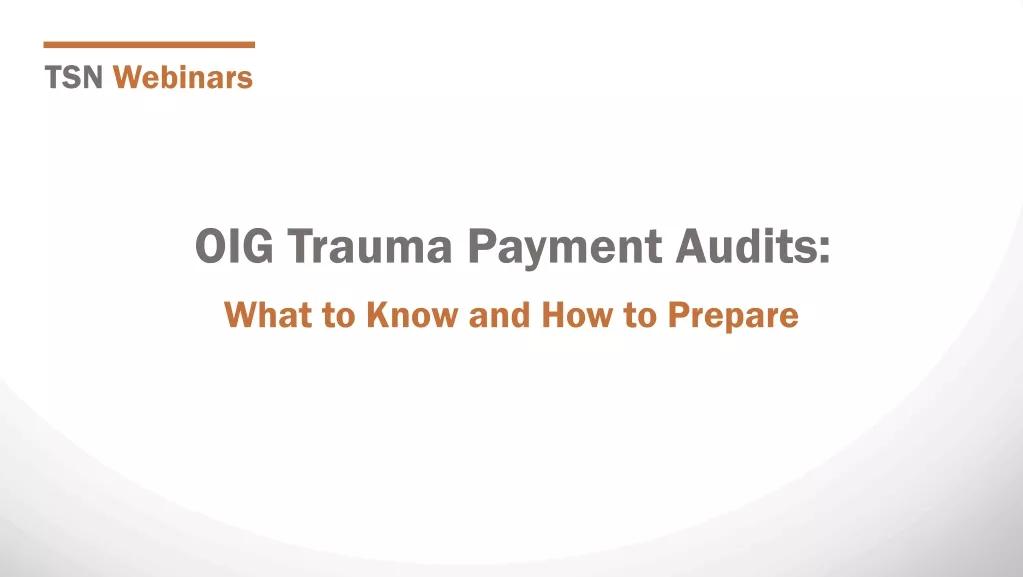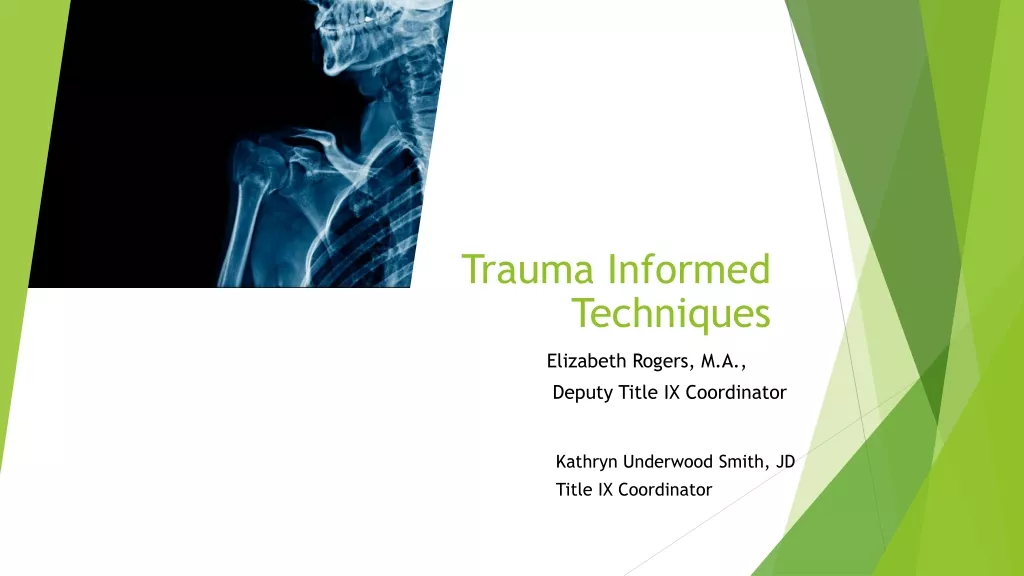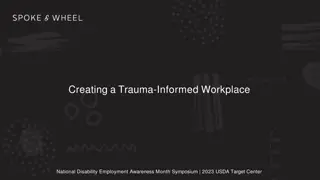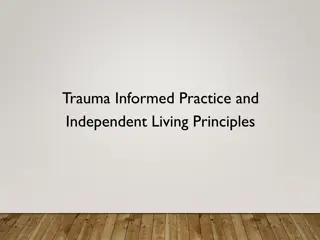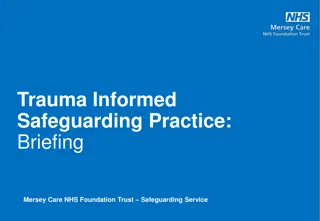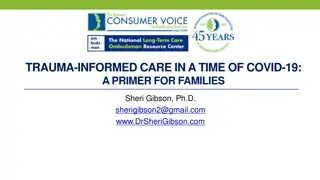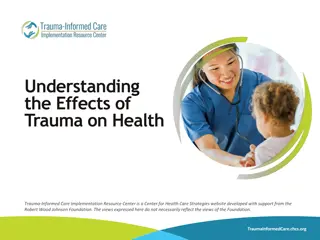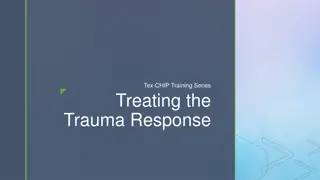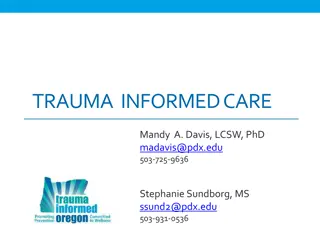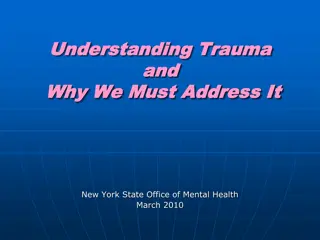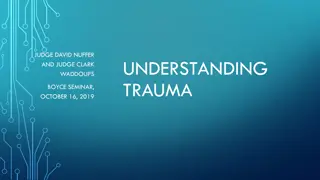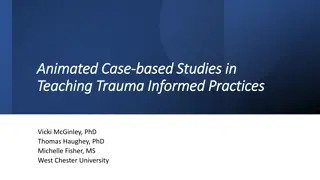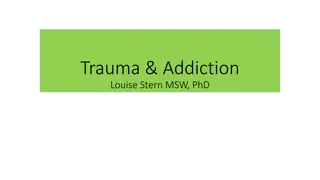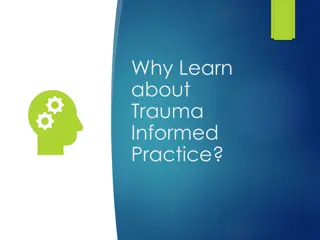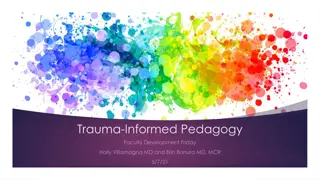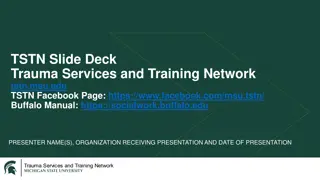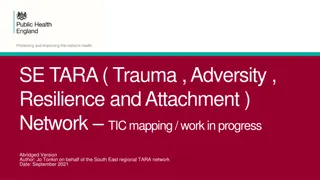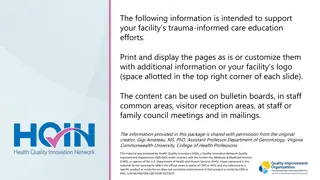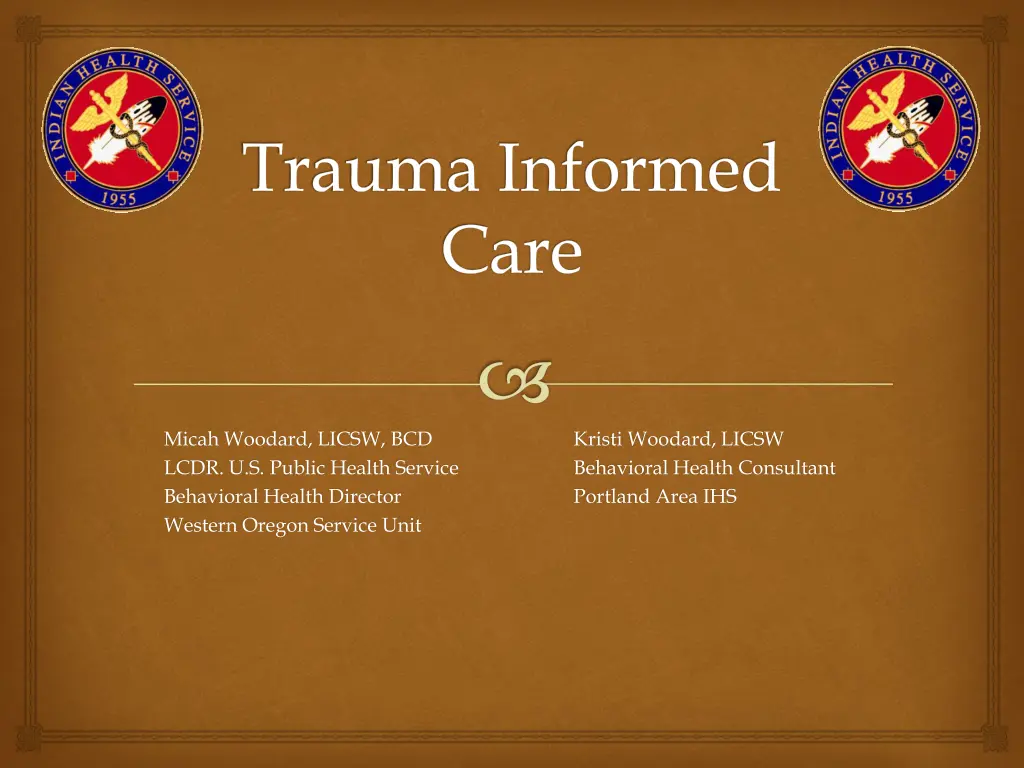
Understanding Trauma-Informed Care
Trauma refers to intense experiences causing harm or threat to physical and emotional well-being. Trauma-informed care involves recognizing the impact of trauma and creating safe, empowering environments for survivors. This approach considers cultural and ecological factors in addressing trauma, especially in populations like American Indians and Alaska Natives who have unique experiences of trauma.
Download Presentation

Please find below an Image/Link to download the presentation.
The content on the website is provided AS IS for your information and personal use only. It may not be sold, licensed, or shared on other websites without obtaining consent from the author. If you encounter any issues during the download, it is possible that the publisher has removed the file from their server.
You are allowed to download the files provided on this website for personal or commercial use, subject to the condition that they are used lawfully. All files are the property of their respective owners.
The content on the website is provided AS IS for your information and personal use only. It may not be sold, licensed, or shared on other websites without obtaining consent from the author.
E N D
Presentation Transcript
Trauma Informed Care Micah Woodard, LICSW, BCD LCDR. U.S. Public Health Service Behavioral Health Director Western Oregon Service Unit Kristi Woodard, LICSW Behavioral Health Consultant Portland Area IHS
What is Trauma? Trauma refers to intense and overwhelming experiences that involve serious loss, threat or harm to a person s physical and/or emotional well being. These experiences may occur at any time in a person s life. They may involve a single traumatic event or may be repeated over many years. These trauma experiences often overwhelm the persons coping resources. This often leads the person to find a way of coping that may work in the short run but may cause serious harm in the long run. (SAMHSA)
Trauma Informed A trauma-informed approach to the delivery of behavioral health services includes an understanding of trauma and an awareness of the impact it can have across settings, services, and populations. (SAMHSA TIP 57) Settings Services Populations
Trauma Informed It involves viewing trauma through an ecological and cultural lens and recognizing that context plays a significant role in how individuals perceive and process traumatic events, whether acute or chronic. (SAMHSA TIP 57)
Trauma Informed Care (TIC) TIC is a strengths-based service delivery approach that is grounded in an understanding of and responsiveness to the impact of trauma, that emphasizes physical, psychological, and emotional safety for both providers and survivors, and that creates opportunities for survivors to rebuild a sense of control and empowerment (Hopper, Bassuk, & Olivet, 2010, p.82). (SAMHSA TIP 57)
Trauma Informed Care & Indian Country The Indian Country Childhood Trauma Center (ICCTC) further defines trauma to address the specific conditions and experiences of American Indians and Alaska Natives (AI/ANs) as a unique individual experience associated with a traumatic event or enduring conditions, which can involve an actual death or other loss, serious injury, or threat to a child s well-being, often related to the cultural trauma, historical trauma, and intergenerational trauma that has accumulated in AI/AN communities through centuries of exposure to racism, warfare, violence, and catastrophic disease. Several distinct forms of trauma have been identified in Indian Country: Cultural Trauma Historical Trauma Intergenerational Trauma Current Trauma (NICWA)
Innovations in TIC Model School Based Service Delivery Application BIE IHS TIC
Introduction Number of youth seen in primary care who present with mental health related problems has nearly tripled over the last 20 years Over one in five children have a mental health disorder severe enough to disrupt their daily functioning, and of those identified, nearly 70 percent will not receive any services. Over 25,000 schools across 50 states are implementing School-Wide Positive Behavior Intervention and Supports, a multi-tiered prevention based framework.
Adverse Childhood Experiences (ACE) Trauma-informed organizations, programs, and services are based on an understanding of the vulnerabilities or triggers of trauma survivors that traditional service delivery approaches may exacerbate, so that these services and programs can be more supportive and avoid re-traumatization. (SAMHSA)
Positive Behavior Intervention and Supports
Chemawa Behavioral Health Center Best Practice School-Wide Systems for Student Success: An Interconnected Systems Framework Model (ICSF)
Big Ideas How Positive Behavioral Intervention and Supports (PBIS)(Multi-tiered Systems of Support (MTSS)) enhance mental health in schools within an Interconnected Systems Framework (ISF) that is Trauma-Informed. How can School-Based Health Centers integrate an Interconnected Systems Framework that is Trauma-Informed. How can client/community centric design thinking significantly impact outcomes (Trauma Informed, 0 Suicide, Child Adolescent Needs Strengths (CANS), Systems of Care/Wrap Around, Quality Management, etc.)
Resources http://www.integration.samhsa.gov/pbhci-learning-community/Trauma- Informed_Care_in_an_Integrated_World_for_CIHS_8_27-12_all_edits.pdf http://www.integration.samhsa.gov/about-us/CIHS_TIC_Webinar_PDF.pdf http://www.integration.samhsa.gov/about-us/CIHS_TIC_Webinar_PDF.pdf http://www.nicwa.org/mental_health/SystemsOfCare/documents/TraumaIn formedCareFactSheet_April2014_000.pdf
Questions/Discussion Contact Information LCDR Micah Woodard micah.woodard@ihs.gov (503) 304-7626 Kristi Woodard, LICSW kristi.woodard@ihs.gov (503) 414-5596

